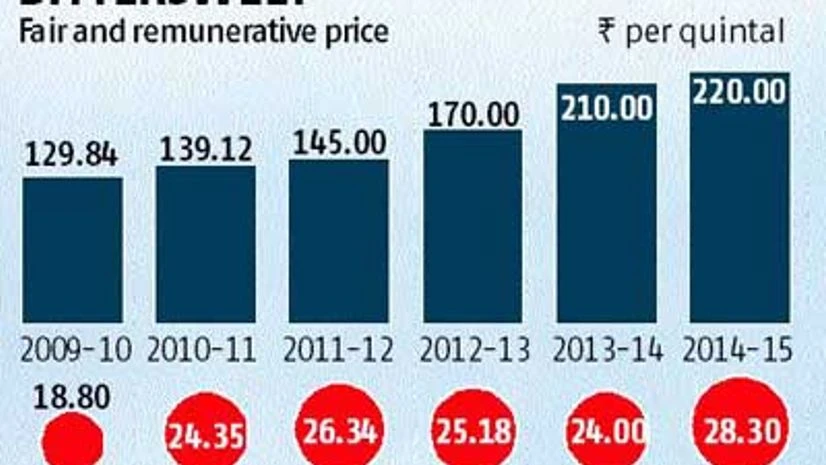Prime Minister Narendra Modi, at a meeting on Saturday, asked his ministerial colleagues to take concrete efforts to implement an earlier decision of increasing ethanol blending with petrol from two to five per cent. He also suggested this could further be raised to 10 per cent to absorb surplus sugar in the long run.
He tasked them with exploring the possibility of exporting sugar to unload surplus stocks of the commodity, as the sector faced a glut and millers were struggling to pay Rs 14,000 crore of arrears to farmers.
Modi discussed a shortage of pulses, suggesting farmers be given incentives over the minimum support price (MSP) to switch to pulses from sugarcane and other crops, sources said.
Taking note of the supply-demand issues in the sector, the PM called for assiduous efforts to increase ethanol blending with petrol, said a statement.
However, he did not announce any additional package for the sugar sector, as he felt a comprehensive policy should be worked out, keeping in mind the interests of farmers, sources said.
Finance Minister Arun Jaitley, Food Minister Ram Vilas Paswan, Agriculture Minister Radha Mohan Singh and Commerce Minister Nirmala Sitharaman were part of the meeting held on Saturday.
At the meeting, the PM reviewed the Rs 6,000-crore soft loans announced in June. At that time, the government had said it wouldn't charge any interest on the loan for a year, bearing the burden of about Rs 600 crore.

These payments would be made directly to farmers' bank accounts, through the Pradhan Mantri Jan Dhan Yojana, to the extent possible. The government had specifically said the move was to support farmers, not industry.
On Saturday, the PM emphasised farmers' interests be kept foremost at all times, and issues related to the sugar sector be monitored regularly. Long-term measures pertaining to the sector were also discussed.
In June, the government had also announced a host of other measures such as raising the mandatory ethanol blending level from two per cent to five per cent, fixing a higher price for ethanol, raising the sugar import duty from 15 per cent to 40 per cent and increasing incentives on raw sugar exports.
"Five-ten per cent ethanol blending is a good long-term solution, but does not address the issue of current cane arrears. Also, it needs to be seen whether industry has the capacity to produce such a huge amount of ethanol and what happens to the chemical sector," said Sudhir Panwar, member, Uttar Pradesh Planning Commission, and president of the Kisan Jagriti Manch.
As prices of pulses have risen of late, this issue was also discussed at Saturday's meeting. It was suggested farmers be given more incentives than the MSP to help them grow more pulses, sources said. In June, the Cabinet Committee on Economic Affairs had announced up to a hike of up to Rs 275 a quintal in the MSP of pulses.
In June, inflation for pulses rose to 22.22 per cent, according to the Consumer Price Index, from 16.62 per cent in the previous month.
On sugar, the food ministry had earlier proposed various measures to overcome the crisis. These included mandatory higher exports, increased ethanol blending with petrol and expansion of co-generation power capacity.
To address the crisis faced by industry, the ministry is believed to have suggested allowing compulsory export of up to four million tonnes of sugar till prices stabilised to an extent, sources said. The export losses incurred by sugar mills, if any, should be borne by the government by raising the sugar cess from the existing 24 paise/kg, they added.
It was also proposed that existing schemes promoting the use of molasses for ethanol production be continued, besides effecting an increase in the capacity of power co-generation.
The sugar sector, which owes about Rs 14,398 crore to cane farmers, is unable to make payments, as it faces a severe liquidity crunch on account of a glut, which has resulted in low prices in domestic markets.
Industry officials said a sharp drop in the mill gate sugar price to about Rs 22/kg in Uttar Pradesh from Rs 28-29 a few months ago had led to a loss of Rs 11/kg for mills in northern states. Similarly, a plunge in prices to Rs 19 a kg in Maharashtra has resulted in mills incurring a loss of about Rs 10 a kg.
In UP, the cost of producing sugar is Rs 33/kg, while in Maharashtra, it is Rs 29/kg.
Icra said going forward, continued pressure on sugar prices, along with high cane costs, was expected to result in subdued profitability and liquidity to sugar companies.

)
